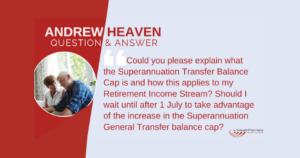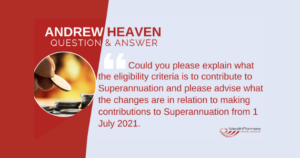Q: I recently received a letter from my Super fund asking me to nominate a Non-Lapsing Death Benefit Nomination. I nominated my estate where the funds would be divided between my adult children. The fund informed me that this would have significant tax implications for each beneficiary. What would they be and what should I do?
A: A Non-Lapsing Binding Death Benefit Nomination typically compels the trustee of your fund to pay the benefit to your nominated beneficiary on your death. Depending on who you nominate as your beneficiary there can be tax ramifications. The trustee has no discretion how to pay the funds to take into consideration tax consequences.
In the first instance, to be eligible to receive a Superannuation Death benefit, your beneficiary must be a dependent under the SIS Act, or your Estate. A dependent can be a spouse, a child, someone who is financially dependent on you or you have an interdependency relationship with.
To receive the benefits tax free the dependent must also be considered a tax dependent. Children over 18 who are not-financially dependent upon you are not tax dependents.
In your situation, whilst you have nominated the estate to receive the benefit, it would be unlikely that your children will be considered tax dependents. The consequences are that tax would be levied on a death benefit at 15% on the taxed element of the taxable component of your benefit. The tax free component will be passed to the beneficiaries tax free. Further, if you have insurance cover within your super fund, the tax on the insurance component of the death benefit could be as high as 30%.
There is obviously more than the tax outcomes to consider when developing an appropriate estate planning solution for your needs. Some alternatives that you might want to consider include potentially amending the death benefit nomination to provide the benefit to a dependent who is also a tax dependent and therefore can receive the benefits tax free. You could amend your will to provide the flexibility to the executor of your estate to distribute the death benefits more tax effectively. Subject to you satisfying Superannuation conditions of release and contribution rules, you could consider a cash-out and Superannuation re-contribution strategy to increase the Tax free component. Finally you can consider cashing out your Superannuation prior to your death. If you are aged 60 or older, the proceeds would be tax free and the cash proceeds can then be dealt with under the terms of your Will.
Discuss your personal circumstances with a Financial Planner to understand the specific tax consequences of your situation. Seek advice from a solicitor in relation to your Will and your estate planning needs.


